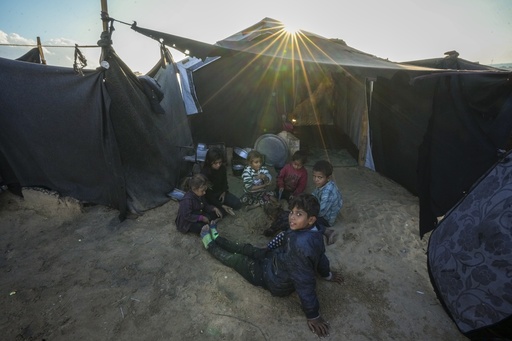
KHAN YOUNIS, Gaza Strip — As winter sets in, nearly 2 million displaced Palestinians in the Gaza Strip are facing a critical struggle against harsh weather conditions stemming from a prolonged 14-month conflict with Israel. Many are having difficulty finding adequate protection from chilling winds, rain, and cold temperatures, with essential supplies like blankets and warm clothing running dangerously low. Aid workers and local residents report that makeshift tents and tarps, which families have depended on for months, are becoming worn and ineffective against the elements.
Shadia Aiyada, who relocated from Rafah to Muwasi with her eight children, describes her dire situation, noting that she possesses only one blanket and a hot water bottle to warm her children in their fragile living quarters. “Every weather forecast warning us of rain and wind fills us with dread,” she stated. “Our tents are at risk of being blown away, and we worry that one day they may collapse while we are inside.” With nighttime temperatures dipping to the low 40s Fahrenheit, Aiyada fears for her children’s health, as they fled with only summer clothes and have had to rely on borrowed garments to stay warm.
The United Nations has voiced concern about the precarious living conditions of those in makeshift shelters, indicating that at least 945,000 individuals are in desperate need of winter supplies. The U.N. emphasizes that these supplies have become excessively expensive within Gaza, raising fears of a resurgence in infectious diseases that peaking last winter amidst rising instances of malnutrition.
According to spokesperson Louise Wateridge, the U.N. Agency for Palestinian Refugees (UNRWA) has been preparing for the winter all year, but the relief efforts have fallen short. In recent weeks, they have distributed 6,000 tents in northern Gaza, but distributions to other areas disrupted by conflict remain stalled. An additional 22,000 tents are stranded in Jordan, with blankets and mattresses also caught in logistics challenges due to a lack of Israeli approval for their movement into Gaza. Many of the supplies have deteriorated from looting or exposure to the elements, as noted by Wateridge.
The International Rescue Committee is also facing significant challenges in providing children’s winter clothing, with numerous approvals necessary from various authorities further complicating their efforts, according to Deputy Director Dionne Wong. “The ability for Palestinians to prepare for winter is essentially very limited,” she stated.
An Israeli government agency responsible for aid coordination claims they have been actively working with international organizations to prepare Gaza for winter, facilitating the shipment of heaters, warm clothing, and other essentials into the territory. The ongoing conflict has already claimed over 45,000 lives, as reported by the Gaza Health Ministry, which highlights that more than half of the casualties are women and children.
The current conflict started after a sudden attack by Hamas in October 2023, resulting in 1,200 deaths in southern Israel, along with over 250 individuals taken hostage. Negotiators are reported to be inching towards a ceasefire agreement, which would hopefully allow for increased humanitarian aid within Gaza.
Currently, the available winter clothing in Gaza’s markets is beyond the financial reach of many residents. Reda Abu Zarada, a 50-year-old woman displaced from northern Gaza, shared her family’s hardships. To keep her children warm, she and the adults have taken to sleeping with the children wrapped closely against them in their tent.
“With no doors, we face pests creeping onto us at night as our tents are in tatters,” she lamented. “The blankets fail to provide warmth, and the cold radiates from the ground. I fear we may wake up one day and find one of the children frozen.”
On a recent chilly evening, she struggled through pain in her knees to prepare a scant meal of fried zucchini over a fire made from discarded paper outside their tent, hoping to provide some warmth for her children before sleep. Another displaced resident, Omar Shabet, who has sought refuge in Gaza City with his three children, voiced his anxiety about the risks of lighting a fire outside their living space for fear of becoming targets for Israeli airstrikes. “We remain inside our tents after dark; the chilling temperatures only worsen by midnight,” he explained. “My daughter, just seven, often cries at night because of the cold.”
